 |
 |
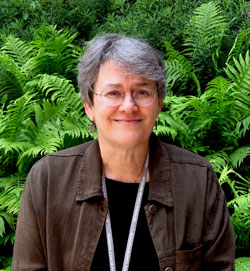
|
|
Tina Levin, Medical Social Worker, HIV Counseling Coordinator, Clinical Center, Social Work Department, National Institutes of Health, Bethesda, Maryland
|
1. I chose this career because...
2. My typical workday involves...
3. What I like best/least about my work …
4. My career goals are …
5. When I'm not working, I like to...
|
|
1. I chose this career because...
|
Back to Top

|
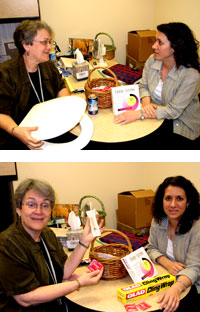
|
|
Tina Levin uses props, such as a toilet seat, soda can and sterile syringe to teach patients about how the HIV virus is and is not transmitted.
|
I chose to become a social worker and an HIV counselor because I can play a role in helping people become themselves. My career has given me a lot of room for personal growth, as I have used my own life experiences to develop compassion for, and make a connection to my patients.
Figuring Out Feelings
My mother is a Holocaust survivor, and my father was an emotionally repressed man. I believe I was left to figure out feelings on my own. I learned early on to treat my mother gently and to take care of her because she had suffered enough in her past. Later in my life, I saw a therapist who helped me continue my quest to figure out feelings and who encouraged me to study social work. It was my own process of learning to become myself that created a passion in me to be genuine and, in turn, to help others in a similar discovery.
Social Work: My Third Career
Although French and math were my favorite subjects, I majored in biology in college. I wasn’t particularly good at biology. I chose it because my parents advised me to be sure and graduate with a degree that would lead to a job. I thought I could work as a lab technician, never realizing how important it was to like your work. For a time, I worked at the NIH in a cancer research lab, but it was not a good match. I realized I wanted more contact with people, not with test tubes. I thought back to the subject I really wanted to pursue in college, foreign language. I channeled that interest into a second career and worked as a high school teacher for two years.
I was nearly 40 years old when I realized my true passion was in social work. So I decided to go back to school to be a social worker. Within the field of social work, I came upon the medical specialty by circumstance. My fieldwork in school placed me in the burn unit of the Washington Hospital Center. While there, I saw a posted sign indicating that NIH was looking to hire social work students for the summer. I spent two summers at the NIH Clinical Center, working with patients with endocrine disorders, lupus, arthritis and musculo-skeletal diseases.
After graduating, I began working full-time at the NIH as a social worker on the cancer and HIV unit. It was a difficult decision to accept a position that deals with terminal illness, death and dying; but I haven’t regretted it since. The personal growth I’ve experienced is more than I ever expected. Eventually, I specialized in HIV/AIDS and assumed the position of HIV Counseling Coordinator for the Clinical Center. (HIV stands for human immunodeficiency virus, which is the virus responsible for acquired immunodeficiency syndrome or AIDS) This means I am the psychosocial expert, with regard to HIV, serving not only patients, but also staff and the community.
Education
- Bachelor of Arts, Biology, University of Pennsylvania, Philadelphia, Pennsylvania
- Master of Social Work, University of Maryland at Baltimore, Baltimore, Maryland
|
|
2. My typical workday involves...
|
Back to Top

|
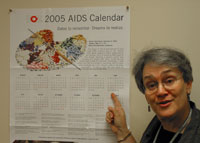
|
|
Tina Levin talks about this year's National HIV Testing Day - an annual campaign to encourage at-risk people to receive HIV counseling and testing.
|
My typical workday varies, since I work with patients, staff, physicians, nurses and other social workers. In my current role, I serve as an HIV/AIDS counselor and resident psychosocial expert on the topic. In the Clinical Center, I am one of many professionals caring for a patient. Beyond counseling patients, my role extends to include multiple inter-disciplinary consultations with other professionals such as physicians, nurses, and case managers.
My typical workweek begins with a management team meeting, where the department chief meets with me and three other managers to discuss unresolved issues from the past week, and to plan for the coming week. Two days per week, I see patients in a clinic for local, uninsured adults with HIV. I also counsel patients who come to the NIH to participate in various studies and discover that they are HIV positive.
I counsel patients about:
- adjustment to illness
- hospitalization
- depression
- anxiety
- stigma associated with AIDS
- employment
- financial, legal and housing issues
- family relationships
- participation in a research protocol
My responsibilities include:
- assessing existing treatment plans for patients
- creating new treatment plans for new patients
- teaching patient’s families how to be supportive of their HIV positive family member
- referring patients to NIH and community resources
- serving on the Internal Review Board at Whitman-Walker Clinic, the group that determines whether clinical studies are ethical and safe for patients
- presenting at national conferences
Additional Roles:
- Supervisor - I supervise seven social workers on a variable schedule.
- Facilitator - I facilitate two nursing support groups for nurses who treat oncology and bone marrow transplant patients. The purpose of these groups is to ensure that the nurses are able to care for their own mental health as they care for their very ill patients.
- Educator - I maintain an information board outside of my office that includes handouts, pamphlets and magazines covering a broad array of HIV-related topics.
- Mentor - This summer, I have a social work intern, so I spend a lot of time teaching her and helping her set career goals.
- Member - I am a member of the Social Work Department Redesign Committee that meets weekly to assess the department’s caseload and delegate assignments.
Unpredictable Work
My work as HIV Counselor is unpredictable. For example, if a patient comes to the NIH to participate in a study, and a routine screening reveals that he or she is HIV positive; then I am called to counsel the patient. If any medical staff are accidentally stuck by a needle or exposed to body fluid that may be HIV positive, I am available to counsel them. Staff frequently knock on my door to ask about getting tested for HIV or to discuss a relative who is HIV positive.
|
|
3. What I like best/least about my work …
|
Back to Top

|
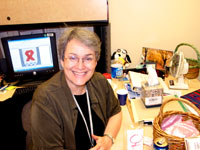
|
|
Tina Levin counsels patients about safe sex and HIV testing options.
|
What I like best about my work is the opportunity to interact with people at a critical, and usually crisis-ridden, time in their lives. People are never more open and vulnerable as when they are in a crisis. Counseling such a patient and succeeding in making a true connection is the addictive part of the job that keeps me coming back for more! This connection is more important than any reward or recognition. My own life experiences have made me more compassionate and empathic when interacting with patients and staff.
What I like least about my work is the mixture of politics and hierarchy in the environment. For example, decisions often appear to be made based on political factors alone. Sometimes money gets spent on things that, in my opinion, are not priorities. In addition, patients come to the NIH primarily for medical treatment and are not always open to my counseling. I also wish I had the time to write papers, but I am always distracted by something more urgent.
|
|
4. My career goals are …
|
Back to Top

|
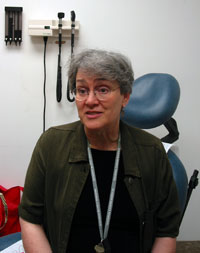
|
|
Tina Levin practices in a free clinic for local uninsured adults with HIV where she enjoys interacting with people.
|
My career goals are in the process of development. After 17 years of practicing social work at the NIH, I am perhaps ready for a change. I have seen a lot of death, dying and suffering. I am currently considering working with the hospital Patient Representative or possibly returning to private practice.
During the mid-1990s I was in a private practice in addition to my work at the NIH, but I stopped the private practice when my 21-year old son died. At the time, nothing was clear to me and I had no idea how I would return to the intense work. Yet, over time I was able to return to my work and eventually connect with patients and their families on a deeper level than before.
Seventeen years of social work has taught me that taking care of myself is just as important as taking care of others. Learning how to maintain boundaries with people dying of AIDS has been hard work, and I am ever mindful of Therese Rando’s (clinical psychologist and leader in the areas of loss, illness, and trauma) words that in this business, you either “grow, or go!” I also keep in mind the words of an activist who spoke at an HIV conference who said that “part of doing the job well is knowing when to say ‘enough.’”
Another idea I have is to study the geriatric field, which has become interesting to me as I have watched my parents age. Alternatively, I have thought about a desk job, perhaps as a public health analyst, but fear I would miss working with people.
|
|
5. When I'm not working, I like to...
|
Back to Top

|
When I’m not working, I like to travel, go to the theater, dine out with friends, and sing in a community choir. I also love to spend time with family, including my significant other, my children and my mother. I am currently planning my son’s wedding.
|
|
|
|
 |